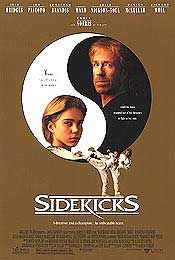“Spoof Crosses the Line”

| None | Light | Moderate | Heavy | |
|---|---|---|---|---|
| Language | ||||
| Violence | ||||
| Sex | ||||
| Nudity |
What You Need To Know:
Sadly, the path of Dewey’s life is littered with illicit sex, heavy drug use and prison time. The movie depicts as a man who is a horrible father and husband, neglectful and abusive of those around him and unable to control his temper. Because it’s a spoof, everything is mocked, including Christianity. Overall, Dewey Cox is one character that’s certainly not a good role model for children, nor one that most people of faith and values will find appealing.
Content:
(PaPa, AB, H, FR, Ho, B, O, LLL, VV, SS, NNN, AA, DDD, MM) Strong, somewhat mixed pagan worldview in what is a comical, ironic spoof of musical bio-pics that makes fun of nearly everything but includes some anti-Christian content where faith and a preacher are mocked in a humanist fashion, main character samples Eastern religion and lives life by rule of, “I don’t need anybody,” brief homosexual content, and some moral elements where man abandons family and children but cleans up his act and returns to them later in life, finding some redemption, plus repeated visits by ghosts; 42 obscenities, three strong profanities and one light profanity; strong, slightly bloody but not gory violence includes “comic” accidental slicing of characters in half with machete, woman dies after falling out window and radio hitting her head, comical scenes of fighting and punching, destruction of property, angry man destroys objects in several angry scenes, father tries to kill son, and man has heart attack; strong sexual content includes implied orgy with fully naked people lounging around, depicted sex scene between married couple, adultery and bigamy, very suggestive clothed dancing simulates sex acts; graphic full female and especially full male nudity in implied orgy scene, graphic full male nudity in two other scenes, and shots of upper and rear male and female nudity; alcohol use and drunkenness; very strong drug references include a pro-marijuana message, scenes of implied cocaine and pill use, and substantial time given to two LSD trips, one of which shows man streaking through town in sumo wrestler underwear while evading police and destroying property; and, lying, man marries second woman even though he’s already married, man has multiple illegitimate children, and very bad family models.
More Detail:
Meant to be an irreverent comedy, “Walk Hard” pulls no punches in poking fun of EVERYTHING — from musical genres, ethnic minorities, Christianity, marriage to parenting, etc., so though the content may be offensive, it’s not to be taken literally. However, parents would most likely want to steer their children away from taking in an eyeful of Dewey Cox’s fast-and-furious lifestyle, which depicts him as a drug-abusing bigamist with a penchant for illicit sex, an aversion to fatherhood (though he has dozens of children by multiple women) and a terrible temper that causes him to repeatedly destroy property.
Where WALK HARD: THE DEWEY COX STORY truly crosses the line is in the amount of full-frontal nudity and drug use. Full LSD trips are shown, marijuana use is practically advocated, and in a scene strongly implying an orgy of musicians and groupies, a close-up of male genitalia is on full display. Additionally, there is some graphic comic violence in which human beings are chopped in half with machetes, only to continue speaking, and a woman is killed by falling out of a window and is then hit on the head by a radio.
The movie attempts to redeem itself, and the character of Dewey Cox, by introducing its June Carter equivalent, Darlene (Jenna Fischer, Emmy-nominated star of TV’s THE OFFICE). Back-lit with a gaudy cross hanging from her neck, Darlene often encourages Dewey to get off the drugs and to straighten out his life. In keeping with the theme, however, Darlene’s faith becomes comic when she portrays the “virgin tease” and wears a bindi shaped like a cross during Dewey’s transcendental meditation phase.
Dewey’s life culminates at an awards ceremony where he sings about his life and the lessons he’s learned, including “love yourself, but not just yourself.” This is after seeking forgiveness and reconciliation from those he’s hurt in the past, including his many children. Too little too late to give this movie a moral worldview, and the prevalence of sex (both in depiction and implication), drugs, and foul language make this a movie with less edification and more trashy comedy than most probably need to see.


 - Content:
- Content: 

